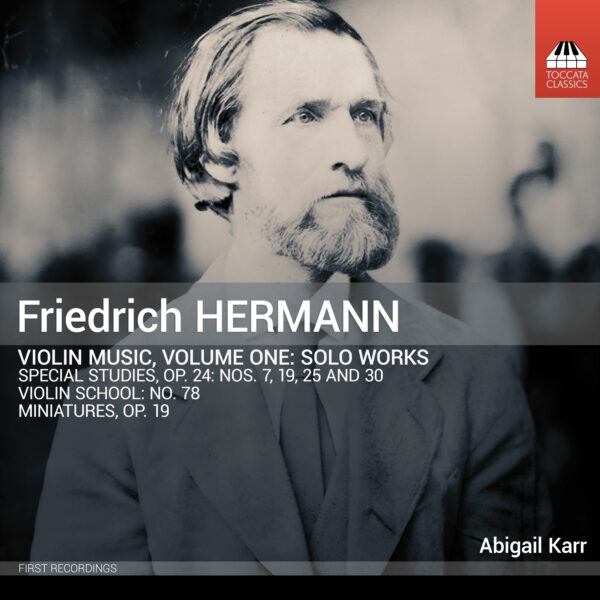Friedrich Hermann: Violin Music, Volume One – Solo Works
The German violinist, violist and composer Friedrich Hermann (1828–1907) spent the six decades of his adult life teaching at the Leipzig Conservatoire and, although his works include a symphony, a string quartet and numerous other chamber pieces for strings, by far the largest part of his output is pedagogical in nature. But he pumped his teaching pieces full of imagination, as the studies here demonstrate. Even though the twenty Miniatures published in 1881 are intended for student violinists, many of them are tiny tone-poems intended both to engage the attention of their players and challenge their techniques – and their mix of poetry and humour should also appeal to adult listeners.
Abigail Karr, violin
Listen To This Recording:
Miniatures, Op. 19 (publ. 1881) (54:54)
Volume 1 (26:28)
- No. 1 March (2:31)
- No. 2 Song (3:08)
- No. 3 Rococo (2:48)
- No. 4 Rondino (1:45)
- No. 5 Funeral March (4:36)
- No. 6 Mail Coach (1:46)
- No. 7 Idyll (2:31)
- No. 8 Humoresque (1:14)
- No. 9 Elegy (3:45)
- No. 10 On the Lake
Volume 2 (27:44)
- No. 11 Round Dance (3:12)
- No. 12 March (3:00)
- No. 13 Ländler (3:58)
- No. 14 Lament (2:42)
- No. 15 Quarrel – (2:04)
- No. 16 Reconciliation (2:36)
- No. 17 Tambourin (0:59)
- No. 18 Scherzo (1:56)
- No. 19 Duet (4:38)
- No. 20 Kalospinthechromokrene (1:24)
Violin School (publ. 1879)
- No. 78 Exercise for the Chromatic Scale (1:41)
Special Studies, Op. 24 (publ. 1888)
- No. 19 Exercise on Nuances (2:25)
- No. 30 Exercise on the Shake (2:29)
- No. 25 For attaining strength in bowing (3:30)
- No. 7 Exercise on Equality of Bowing (1:34)



Fanfare Magazine :
‘The music is surprisingly compelling, even entrancing in many instances. […] hearing [these pieces] on this recording makes it difficult to imagine that a true novice violinist would not have a great challenge with most of these little pieces. This illusion is surely due to the wonderful violin playing of Karr. Her technique is superb, but what distinguishes her manner is an utterly unpretentious, almost naïve style, avoiding the kind of showiness that would sink this music. Her beautifully focused tonality and tasteful dynamic phrasing are anything but the sounds of a beginner. […]
even the simple, slow studies are written with an expressive intent. […] This whole production is an unexpected delight; Karr is an exemplar of a scholarly artist.’
—Peter Burwasser, Fanfare Magazine, February 2025